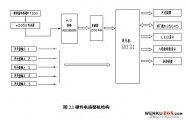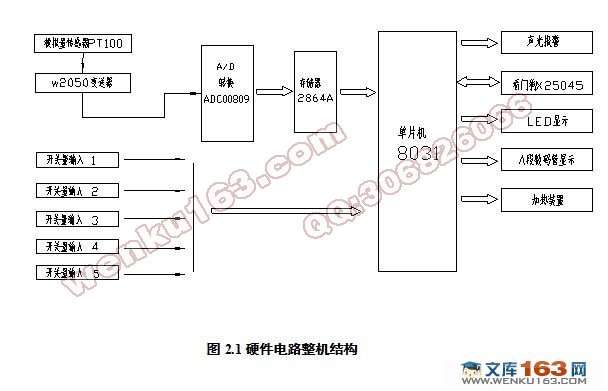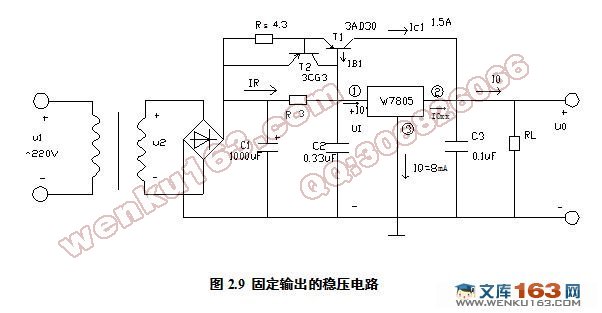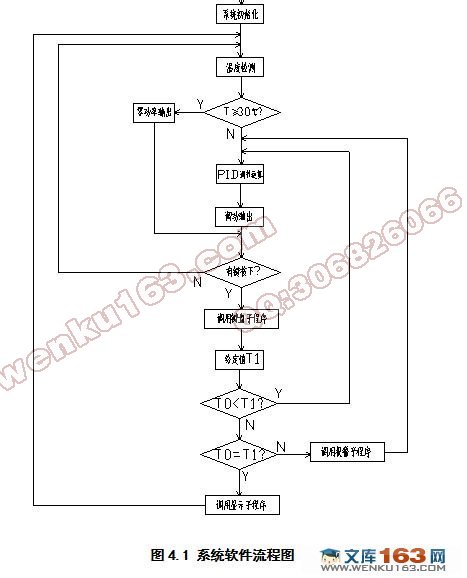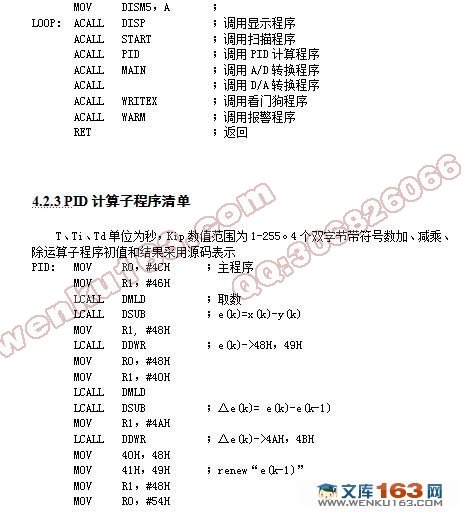电热水暖恒温自动控制系统设计(含程序)(任务书,文献综述,外文翻译,毕业论文28000字)
摘要
温度是电热水暖控制的主要被控参数之一,可是由于温度自身的一些特点,如惯性大,滞后现象严重,难以建立精确的数学模型等,给控制过程带来了难题。本文研究合适的控制方案对电热水暖温度进行控制,技术要求是调节时间短,超调量为零且稳态误差在±1℃内。对电热水暖这样一个被控对象进行控制,有很多方案可选。首选的方案是 PID 控制,因为它简单,容易实现,在大多数情况下可以满足性能要求,目前,PID 控制仍占 80%以上。它有可消除稳态误差的优点。PID 控制的性能取决于参数的整定情况,对那些对象模型复杂和模型难以确定的控制系统,具有很大的局限性,而且它的快速性和超调量之间的矛盾关系,使它不一定能满足调节时间短、超调小的技术要求。本文设计了以8031单片机为核心的温度控制器,选用 Pt100 为温度传感器,采用ADC0809 为 A/D 转换器件,同时由过零触发光电耦合器件 MOC3061 和晶闸管 BTA20 构成驱动执行单元,由按键、LED 数码显示器及报警单元等组成人机联系电路。在进行硬件设计的同时,也设计了相应软件程序流程图。
关键词:温度;PID 控制;8031单片机;Pt100温度传感器;ADC0809转换器
Abstract
Temperature is one of the main parameters controlled in the electric water heater,But it is very difficult to control temperature well because of some characteristics of the temperature itself. For example temperature’s inertia is great,it’s time-lag is serious and it is difficult to establish accurate mathematical model of the object. This paper is to study an adapt control method to control the temperature of the electric water heater,the technology demand of control method is:the regulating time must be short, the overshoot must be zero and steady-state error must be in ±1℃.For the electric oven, there are many control methods to be selected.The first is the PID method. It is simple and easily realized. In most cases, it can meet the control demand. At present, in all of the control methods in use, the PID method still accounts for over 80 percent. It has the advantage to eliminate the steady-state error. Its efficiency depends on it parameters. In terms of those control objects whose models are complicated or are established difficultly, the PID method has very great limitation. Moreover,because of the conflict between quickness and the small overshoot, PID control cannot meet control demand.Second method can be fuzzy control, because it has the advantage of quickness, In the paper 8031 is used as controller, Pt100 is used as temperature sensor, and ADC0809 is used as A/D converter, because of it’s precision being high and anti-interference ability being strong. Performance unit is composed of photoelectrical coupler MOC3061 and TRIACS BTA20.Man-machine circuit is composed of buttons, LED and warning unit, etc.While the hardware circuit is designed, the corresponding procedure flow chart is alsodesigned.
Key words: Temperature ;PID Control;8031;Pt100 temperature sensor;ADC0809A/D converter
目 录
第一章.硬件电路设计方法及原则 - 1 -
1.1 硬件电路设计单片机的发展和应用 - 1 -
1.2 单片机应用系统硬件电路的组成及设计原则 - 2 -
1.2.1单片机硬件电路的组成 - 2 -
1.2.2单片机硬件设计的原则 - 2 -
1.3 单片机应用系统的可靠性设计 - 3 -
第二章 单片机系统设计方案与分析 - 5 -
2.1硬件电路的整机结构 - 5 -
2.2系统设计中用到的元器件介绍 - 6 -
2.2.1 8031单片机 - 6 -
2.2.2 A/D转换器的选择 - 7 -
2.2.3地址锁存器的选择 - 9 -
2.2.4 2864A芯片 - 10 -
2.2.5 8155可编程接口芯片 - 10 -
2.2.6 X25045芯片简介 - 12 -
2.2.7 DAC0832转换器 - 14 -
2.3 5V直流稳压电源电路设计 - 15 -
2.4 单片机系统设计 - 16 -
2.4.1 看门狗电路设计 - 16 -
2.4.1.1 看们狗电路简介 - 16 -
2.4.1.2 X25045看门狗电路设计 - 17 -
2.4.2 ADC0809与8031的接口 - 20 -
2.4.2.1以查询方式实现与8031的接口 - 20 -
2.4.2.2以中断方式与8031单片机的接口 - 21 -
2.4.3 DAC0832与8031的接口电路 - 21 -
2.4.4 LED动态显示电路 - 23 -
2.4.5 独立式按键电路 - 24 -
第三章 温度检测与控制系统设计方案 - 25 -
3.1 系统所用到的元器件介绍 - 25 -
3.1.1 固态继电器 - 25 -
3.1.2 BT102发光二级管 - 27 -
3.1.3 温度传感器PT100 - 27 -
3.2 温度检测电路设计 - 29 -
3.3 温度控制电路设计 - 33 -
3.4 报警电路设计 - 34 -
3.5 硬件电路图及工作原理 - 35 -
第四章.系统软件程序控制 - 39 -
4.1软件可靠性设计 - 39 -
4.1.1 数字滤波技术 - 39 -
4.1.2 CPU的抗干扰方法 - 40 -
4.2 系统软件程序设计 - 41 -
4.2.1软件程序流程图 - 41 -
4.2.2 温度控制程序 - 42 -
4.2.3 PID计算子程序清单 - 43 -
4.2.4 ADC0809与8031的接口程序 - 49 -
4.2.5 DAC0832与8031的接口程序 - 51 -
4.2.6 与单片机接口的声音报警电路程序 - 53 -
4.2.7 看门狗电路程序设计 - 54 -
4.2.8 6位动态LED显示程序 - 59 -
4.2.9 独立式按键的软件实现 - 61 -
4.3.0 系统程序流程总图 - 63 -
第五章.单片机应用系统的调试 - 64 -
5.1 单片机应用系统中常见的故障 - 64 -
5.1.1 单片机应用系统常见的硬件故障 - 64 -
5.1.2 单片机应用系统中常见软件的错误类型 - 65 -
5.2 单片机应用系统的仿真调试 - 65 -
参考文献 - 67 -
设计总结 - 68 -
致谢 - 69 -
|
